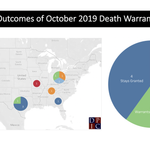
Ten executions were scheduled to take place in October 2019, more than in any other month in the last two years. As the month closed, however, nine of those executions were not carried out. The 90% rate of warrant failures symbolizes the death penalty’s continuing decline and the widespread problems states are having with its implementation. And with eight active execution dates pending and two other stays of execution in place in November and December, 2019 is nearly certain to become the fifth consecutive year of fewer than 30 executions in the United States.
A DPIC review of the October death warrants found that four death-row prisoners received stays of execution, two warrants were withdrawn because of case developments, 1 warrant was halted by reprieve, and there was 1 execution. Two prisoners died on death row, making their warrants moot.

As of November 1, 2019, 11 states and the federal government had issued death warrants scheduling a total of 63 execution dates. Seventeen of those warrants have resulted in executions, while 19 executions have been stayed by the courts, 13 others halted by reprieve, 3 executions rendered moot when the prisoners died of other causes on death row, and 3 execution dates were withdrawn. In 2018, 37 of the 62 execution dates scheduled were not carried out, or nearly 60% of death warrants. In 2017, 60 of the 83 scheduled execution dates were halted (72.3%).
The October death warrants were spread across five states and their dispositions were illustrative of several contentious issues in death penalty cases.
Russell Bucklew was executed in Missouri on October 1, following a divisive 5 – 4 United States Supreme Court decision in which the majority wrote that “[t]he Eighth Amendment, does not guarantee a prisoner a painless death” and prohibits only executions that intensify the sentence of death with “superadd[ed] … terror, pain, or disgrace.” The Court required condemned prisoners to prove that the state had a significantly less painful execution method available to end his life, even as it acquiesced in state secrecy practices that impeded the prisoner from demonstrating that such methods might be available.
The next nine executions scheduled to follow Bucklew’s either were halted or were rendered moot by the prisoners’ deaths.
State courts stayed four executions — three by the Texas Court of Criminal Appeals. On September 23, the Texas court halted Stephen Barbee’s October 2 execution to determine whether to apply to his case a 2018 U.S. Supreme Court decision granting a new trial to a death-row prisoner whose trial lawyer had conceded his guilt against his wishes. On October 4, the Court of Criminal Appeals stayed the October 10 execution of Randy Halprin and returned his case to the Dallas County courts to adjudicate his claim that the virulent anti-Semitism of his trial judge had denied him a fair trial before an impartial tribunal. Then, on October 22, the court called off the October 30 execution of Ruben Gutierrez based on multiple defects in the issuance and service of the death warrant. Ray Jefferson Cromartie, also scheduled to be executed on October 30, received a day-of-execution stay from the Georgia Supreme Court, also based upon irregularities in the issuance of his death warrant. Georgia prosecutors obtained a new death warrant for Cromartie on November 1, rescheduling his execution for the week of November 13.
Case developments led state courts to withdraw two October death warrants. Ohio had scheduled Angelo Fears for execution on October 17. But on May 22, 2019, prosecutors reached an agreement with the defense in which Fears’ death sentence was vacated and he was resentenced to life. In turn, on June 24, the Ohio Supreme Court vacated his death warrant. Later, on October 3, a Texas county court judge withdrew the death warrant that had scheduled Randall Mays to die on October 16, amid concerns that Mays may be mentally incompetent.
The executions of Tennessee death-row prisoner Charles Walton Wright and Ohio death-row prisoner Jason Dean were mooted by their deaths. Wright, who was scheduled to be executed October 10, died May 17, 2019. Dean, scheduled for an October 23 execution, died March 23, 2019. Another Ohio execution date, scheduled long in advance, was removed by virtue of a reprieve granted by former Governor John Kasich in September 2017. At that time, Kasich rescheduled James Frazier’s October 17 execution for October 20, 2021.
Ohio has been plagued by difficulties in obtaining execution drugs, and Gov. Mike DeWine has said he will not place state medical services at risk by diverting medicines purchased by other state agencies for therapeutic purposes to the Department of Correction for use in executions. On October 30, citing the lethal-injection drug problem, DeWine issued reprieves postponing Ohio’s next two executions.
Although Texas courts halted all four executions it had scheduled for October, it has already executed 7 prisoners in 2019 and has four more executions scheduled for November and December. With October’s developments, none of the 18 execution dates set for Ohio prisoners in 2019 will be carried out.
DPIC, Outcomes of Death Warrants in 2019; DPIC, Outcomes of Death Warrants in 2018; DPIC, Outcomes of Death Warrants in 2017.
DPIC analysis by Robert Dunham.



